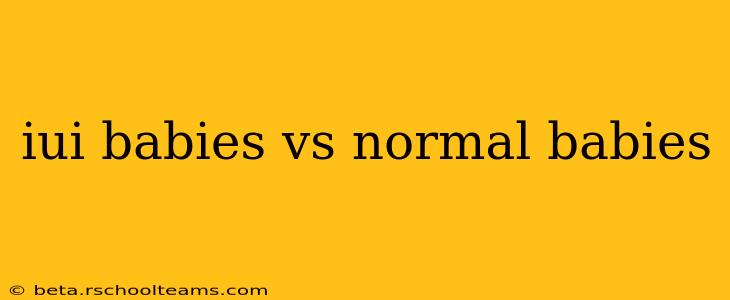The question of whether babies conceived via intrauterine insemination (IUI) differ from those conceived naturally is a common one among prospective parents. While the method of conception differs, the overwhelming scientific consensus points to minimal observable differences between IUI babies and those conceived naturally. However, let's explore this topic in detail, addressing some common concerns and misconceptions.
Are IUI Babies Healthier Than Naturally Conceived Babies?
There's no scientific evidence suggesting IUI babies are inherently healthier or less healthy than naturally conceived babies. The health of a baby is influenced by a multitude of factors, including the mother's overall health, genetics, prenatal care, and environmental influences. The method of conception, in itself, is not a significant determinant of a child's health. IUI involves using medication to stimulate egg production and then placing sperm directly into the uterus, increasing the chances of fertilization. This process doesn't inherently alter the genetic makeup of the resulting embryo.
What Are the Potential Differences Between IUI and Naturally Conceived Babies?
The primary difference lies in the circumstances surrounding conception. Couples undergoing IUI often face fertility challenges, such as male factor infertility, unexplained infertility, or mild endometriosis. This doesn't mean the resulting babies will be any different, but it's important to acknowledge that the parents may have undergone medical interventions and emotional stress associated with fertility treatments. This is a crucial distinction, as the parental experience, not the method of conception, can sometimes indirectly influence the child's early development.
Do IUI Babies Have Higher Risk of Birth Defects?
Studies have not established a link between IUI and an increased risk of birth defects. The risk of birth defects is primarily determined by genetic factors and environmental exposures during pregnancy. Moreover, the rigorous screening and monitoring involved in IUI procedures might even lead to earlier detection of potential complications, ensuring timely interventions.
Are There Differences in Development Between IUI Babies and Naturally Conceived Babies?
Extensive research has not demonstrated any significant developmental differences between IUI babies and naturally conceived babies. Children conceived through IUI generally reach developmental milestones at the same rate as their naturally conceived peers. Factors such as nutrition, parental care, and environmental stimulation play a far greater role in a child's development than the method of conception.
Are There Long-Term Health Differences Between IUI Babies and Naturally Conceived Babies?
Current research doesn't indicate any long-term health disparities between children conceived through IUI and those conceived naturally. The long-term health outcomes are largely influenced by genetics, lifestyle choices, and environmental factors.
What About Multiple Births with IUI?
While IUI carries a lower risk of multiple births compared to in-vitro fertilization (IVF), the potential for twins still exists, especially when fertility medications are used. Multiple births can present unique challenges, but these challenges are related to the multiple gestation itself, not the IUI procedure specifically.
In Conclusion:
While the journey to conception may differ, IUI babies are essentially the same as naturally conceived babies. The health and development of a child are shaped by numerous factors, with the method of conception playing a negligible role. The focus should be on providing a healthy and nurturing environment for the child's growth and development, regardless of their conception method. The joy and challenges of parenthood are largely independent of how the child was conceived.
